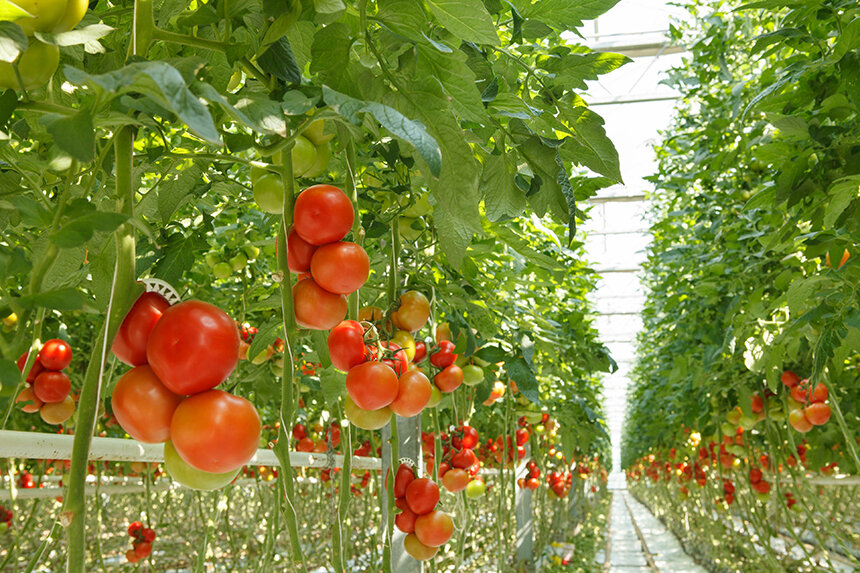Massive Greenhouse Proposal Pits Need for Local Food Production Against Town’s Rural Character
By BRIAN P. D. HANNON/ecoRI News staff
 |
| Those behind the project say the proposed greenhouse operation could yield 650,000 pounds of tomatoes per acre, with an expansion eventually to 1,000 total acres. (istock) |
A huge greenhouse project producing local food using advanced growing techniques and renewable energy seems on the surface to be an unassailable win for Rhode Island, but the planned launch raises concerns in the small community where millions of tomatoes would be grown.
Rhode
Island Grows LLC says its pending operation at Schartner Farms off South County
Trail in Exeter will reduce the supply chain Rhode Islanders rely upon for
produce shipped from other states and bring needed revenue to the state’s
agricultural sector.
But
the industrial scale and location of the venture, which broke ground June 1, is
a source of questions from municipal officials and opposition from at least one
contingent of residents in Exeter.
Rhode
Island Grows bills itself as “an advanced controlled environment vegetable
produce company.” In simple terms, the company plans to grow a lot of tomatoes
in high-tech greenhouses.
The
company’s website projects the site could yield 650,000
pounds of tomatoes per acre, with an expansion to 350 acres in five years and
eventually to 1,000 total acres. There would be five employees per acre,
according to Rhode Island Grows. The company aims for distribution in six
states, noting there is a market of 47 million people in the corridor between
Boston and New York.
The
key to the project is a technology called controlled environment agriculture (CEA), an
automated, hydroponic system for cultivating crops in a closed setting. The
system, which can grow food on a large scale even within the confines of a
city, has resulted in extensive agricultural production in the Netherlands
despite the nation’s diminutive size, according to Rhode Island Grows.
In
a video on its website, Rhode Island Grows chairman Tim Schartner and chief
financial officer Frederick Laist explain the aims of the operation, which
would use the temperature-controlled greenhouses to establish conditions for
maximum plant procreation throughout the year.
“By
growing here in Rhode Island we can pick produce at five in the morning and get
it on a supermarket shelf in New York City in time for someone to pick it up
and buy it on their way home for dinner,” said Laist, who projected plants
grown to 27 feet tall, lasting about 11 months and each producing 100 pounds of
tomatoes.
The
process would use 1 percent of the water normally deployed in field
agriculture, while all electricity would be produced on site. The company plans
to install “significant solar arrays” resulting in “near a negative carbon
footprint,” Laist said.
Schartner,
whose family owns the farmland, said robotics within the greenhouses would
prevent contact with human hands before the tomatoes reach stores. While the
work would primarily be computerized, he said the operation would provide full-time
employment and training for its employees and the resulting production would
benefit Rhode Island’s economy.
“We
can produce incredible wealth just by producing our own food,” Schartner said
in the video.
Rhode
Island Grows did not respond to ecoRI News questions submitted by email.
Project debated
Ken Ayars, chief of the agriculture division of the Rhode Island Department of
Environmental Management (DEM), said the state needs to embrace a blend of
traditional farming and new technology to be successful.
New England produces only 10 percent of its own food, with Rhode Island operations delivering less than 2 percent of the state’s supply.
The deficiency creates a
collective interest in increasing the amount of locally produced food, while
the coronavirus pandemic exposed the difficulties of a stretched supply chain,
he said.
Rhode
Island Grows is an example of high food production in a small area, Ayars said.
The CEA greenhouse system — set above the ground rather than building down into
the soil — would not cause unalterable change to the property at Schartner
Farms, such as cement slabs and other permanent fixtures underlying most
construction. The ground would remain usable as farmland even if the company
dismantled its operation in the future, he said.
“We
have to recognize those opportunities are how we move forward to produce food,”
Ayars said, noting the state has a responsibility to seek food security through
traditional farming practices and technologies enabling increased local
production.
The
Exeter Town Council voted June 7 to send a Rhode Island Grows proposal for a
zoning overlay district back to the Planning Board for further consideration.
The company made significant changes to its initial proposal, which the
Planning Board did not have time to fully consider before a deadline to forward
a recommendation to the council.
The
five-member Town Council noted the zoning overlay proposal does not refer to a
specific lot and anyone within the overlay area could apply to establish
operations under approved guidelines. Although Rhode Island Grows proposed the
overlay district, the company would need to make a separate application for its
property.
Ayars said Rhode Island Grows has spent the past two years on a path to obtain state permits for the project with the assistance of DEM and has so far obtained two of three necessary permits, including combined wetlands and stormwater permits issued May 4 for what is referred to as a solar facility.
The project would include a paved access road,
paved parking lots, a crushed-stone driveway, an irrigation pond, an onsite
wastewater treatment system, a stormwater management system and a chain-link
fence.
A
phased permitting process allowing the company to proceed with construction in
stages justified its June 1 groundbreaking ceremony, which Ayars attended,
before receiving full zoning clearance from Exeter.
Rhode
Island Grows is “perfectly in line with what DEM has laid out as a process that
works,” Ayars said. He added that the company may be able to take advantage of
state laws empowering plant-based agriculture concerns to grow what they need
to remain viable, which could come into play in negotiations with Exeter.
“How
those will be applied to the situation is between the Schartners and their
attorneys and the town, but I’m sure it will probably be part of the
discussion,” Ayars said.
Town
Council member Olivia DeFrancesco cited a possible conflict with Exeter’s
comprehensive plan among “several concerns” she has about the proposed overlay
district. She said the proposal seems at odds with a section of the plan
calling for focus on “small-scale, clustered, architecturally-sensitive
development consistent with the rural character of the town.”
“Many of the Town’s policies in the current comprehensive plan reference the need to protect farms in prime farmland as well as protect, promote and support the Town’s agricultural and recreational base,” she wrote in an email to ecoRI News.
“This project will encourage the development of at least 33 acres of
prime farmland for just one CEA. It opens the door for other CEAs of a similar
size. There is no consideration of small farmers.”
Allowing
greenhouses of up to 1 million square feet, along with a utility-scale solar
unit, is inconsistent with Exeter’s comprehensive town plan
and needs to be resolved, DeFrancesco said.
“They
are asking the Town for this proposal to be an agricultural greenhouse use with
accessory solar power but the solar is being built first?” she wrote. “This
seems backward to me.”
Megan
Cotter, chair of the Exeter Democratic Town Committee community group, said she
doesn’t take issue with the goals laid out by Rhode Island Grows, just the
means.
“The
use is good. Rhode Island needs to produce more fresh fruit,” Cotter said.
The
industry-scale zoning in a residential and rural area is one of Cotter’s
primary concerns. The company has significantly downsized the minimum size of
the greenhouses originally written into its initial overlay request,
effectively allowing smaller projects without varying its own expansion plans,
she said.
“The
applicant made the self-serving rule for the largest development in Rhode Island
history,” she said, noting the project could eventually match the 1 million
square footage of the shopping mall in Warwick.
Despite
its size, the project will not benefit the town’s tax base, since greenhouses
are exempt from taxes under state law and solar project taxes are limited, said
Cotter, adding that the greenhouse tax exemption makes sense “because farmers
need help right now,” but should not enable misuse of the rule by companies.
Cotter
wants to accommodate the need for renewable energy and local food production
with responsible land use. Rhode Island Grows does not need to be on prime
farmland and could be established in an industrial zone elsewhere thanks to its
enclosed CEA architecture. The company’s plans for a large solar facility would
also go against current zoning, she said.
“This
is like taking the rules and throwing them out the window,” she said, noting
the clash with Exeter’s aim to maintain a rural atmosphere. “This entire
project goes against the comprehensive plan.”
